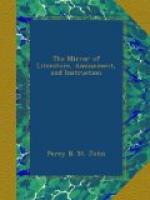In the House of Lords, in reply to some censurable observations on his acceptance of office which had been made elsewhere, his lordship explained his motives with great candour. After an allusion to his difficulty in resigning his high station as a representative for Yorkshire, Lord Brougham said, “I need not add, that in changing my station in parliament, the principles which have ever guided me remain unchanged. When I accepted the high office to which I have been called, I did so in the full and perfect conviction, that far from disabling me to discharge my duty to my country—far from rendering my services less efficient, it but enlarged the sphere of my utility. The thing which dazzled me most in the prospect which opened to my view, was not the gewgaw splendour of the place, but because it seemed to afford me, if I were honest—on which I could rely; if I were consistent—which I knew to be matter of absolute necessity in my nature; and if I were as able as I knew myself honest and consistent—a field of exertion more extended. That by which the Great Seal dazzled my eyes, and induced me to quit a station which till this time I deemed the most proud which an Englishman could enjoy, was, that it seemed to hold out the gratifying prospect that in serving my king I should be better able to serve my country.”
Already has the official elevation of Lord Brougham been attended with manifest advantages, and promises of still greater benefits to the nation. Only such as are accustomed to the cares of office can form but a faint idea of the perplexities which beset the Lord Chancellor on the recent dissolution of parliament; yet in this arduous scene Lord Brougham is believed by all but the bitterest of his political opponents, to have comported himself with becoming equanimity. A political contemporary observes, upon his recent appointment—“There is no instance in modern times of an elevation marked with the same characters. Lord Brougham had never before been in office; he had passed through none of the degrees which for the most part, lead to the proud eminence where he now stands. We have had learned Chancellors, and political—or, we would rather say, politic Chancellors—but never before Lord Brougham (with, perhaps, the exception of Erskine), have we had what may be justly called a popular Chancellor. * * The consideration which he disdained to accept from party or from power in the House, his conduct has won from the great mass of his countrymen out of it. We speak the plain and simple truth when we say—and that not for the first time—that at no period of our history since the era of the Commonwealth has any one Englishman contrived to fix so many eyes upon him as Lord Brougham has for the last few years."[4]
Of Lord Brougham’s qualifications as a barrister we have already spoken. To the hearing of appeals in the House of Lords, an important section of the public business, his Lordship brings qualifications not possessed by any of his predecessors. Seven years’ practice at the Scotch bar, and a very extensive employment in appeals from that country (for he has been engaged in almost every case of importance for the last ten years) have made him familiar with the machinery of the law on which his decisions bear; and he therefore undertakes his judicial task with professional confidence.




